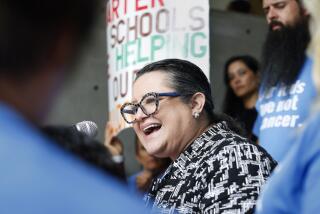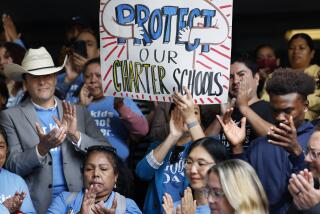Merger of 2 organizations would create California’s largest charter school operation
Two of the state’s largest charter school organizations are in talks to merge, raising questions about the future of their 33 campuses and the local charter movement. Such a partnership could create the largest charter school operation in California, and one of the nation’s biggest with 12,000 students.
Negotiations are underway between financially struggling ICEF Public Schools and Alliance College-Ready Public Schools, both based in Los Angeles. Word of a looming deal emerged at a San Diego charter-school convention this week in remarks by former L.A. Mayor Richard Riordan, who has served on the boards of both organizations.
In a later speech on Wednesday to the same gathering, current Mayor Antonio Villaraigosa exhorted charter schools to take charge of more low-performing traditional schools, accept greater numbers of harder-to-educate students and support the closing of low-performing charters.
Charter schools are publicly funded, independently operated and free of some regulations that govern traditional schools; most are non-union.
ICEF and Alliance are different in form and history, a distinctness that needs to be preserved, ICEF officials said.
Alliance was begun by high-powered business and community leaders involved in the LEARN reform effort of the early 1990s within the Los Angeles Unified School District. Chief Executive Judy Burton had a long L.A. Unified career before joining other Alliance leaders who, like her, had become impatient with the pace of school improvement. The 18 Alliance schools focus intensely on academics, typically relegating arts and athletics to informal after-school activities. The vast majority of its students are low-income Latinos.
ICEF was started by Mike Piscal, a brash former Harvard Westlake teacher who developed a clientele largely within the black community, which appreciated his inclusion of arts programs and formal athletics. He served substantial numbers of low-income students, but also retained a solid base within the black middle class. Piscal left ICEF last fall amid his organization’s financial woes — he had long resisted cutting programs to keep pace with declining and increasingly delayed state funding.
“I just hope that something that was important to the entire community will not be lost if this merger happens,” Piscal said Wednesday.
A merger could eliminate distinct, valuable choices for parents, said Priscilla Wohlstetter, a USC professor who directs the university’s Center on Educational Governance: “I honestly am not certain that we have found the McDonald’s recipe for teaching public school students.”
Bigger is not necessarily better, said Los Angeles teacher Janet Landon, who heard both mayors speak and is trying to start her own charter. “To create another 30 schools under a single bureaucracy is just replicating the school district,” she said, only without a union to protect employee rights or a publicly elected board to hold officials accountable.
Riordan’s efforts over the last few months resulted in fundraising and debt relief that improved ICEF’s balance sheet by $15 million, but he said the group still needs $11 million to become fiscally sound.
Several ICEF insiders faulted Riordan for becoming so committed to a merger that he effectively discouraged donors from supporting an independent ICEF.
Riordan disagreed: “It’s hard to get people to invest in a company that’s having a lot of financial trouble. For us to have raised the amount of money we did raise — it’s a miracle.”
“Both organizations are dedicated to merging,” Riordan said in an interview.
ICEF chief executive and former LA school board member Caprice Young said that Riordan, who chairs her board, had spoken prematurely about the certainty of a merger. She also conceded that barring an alternate financial rescue, a “partnership,” as she termed it, would be difficult to avoid.
Under terms proposed by Alliance, it would control a governing-board majority and could close an ICEF school “that does not maintain adequate enrollment or meet expected academic standards.” A couple of ICEF schools are not fully enrolled.
The ICEF schools would probably be overseen by a director who would report to Alliance, in an attempt to maintain ICEF’s unique approach.
Some consolidation within the charter school sector is inevitable, Villaraigosa said in an interview. But he also expressed concern that small operators who run quality schools could be squeezed out.
The mayor billed his address as a follow-up to one in December, in which he criticized the local teachers union as an obstacle to reform. Villaraigosa, besides demanding more of charters, also said that traditional schools deserved the same flexibility as charters, and that all models of schools should be working better together, including on efforts to increase funding for schools.
“Imagine the day when parents and students can choose a school based on learning style and teaching method,” he said, “instead of the number of metal detectors on campus or the percentage of teachers laid off last year.”
More to Read
Start your day right
Sign up for Essential California for news, features and recommendations from the L.A. Times and beyond in your inbox six days a week.
You may occasionally receive promotional content from the Los Angeles Times.







